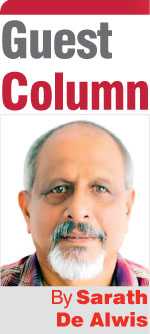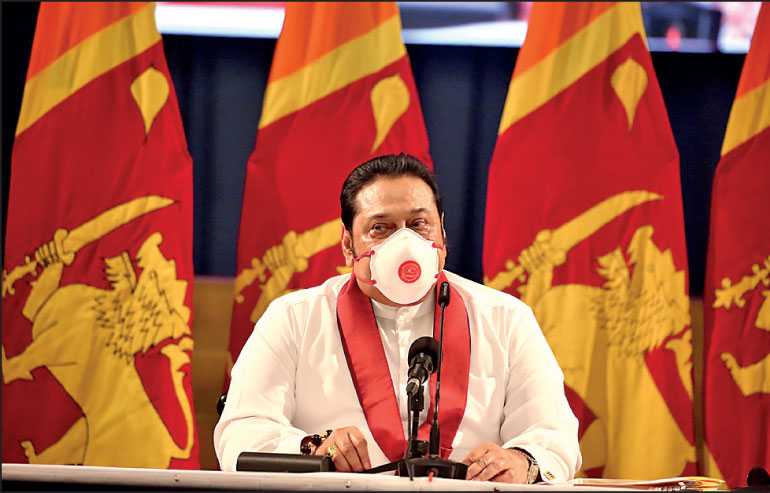Sunday Mar 01, 2026
Sunday Mar 01, 2026
Wednesday, 6 May 2020 00:00 - - {{hitsCtrl.values.hits}}

Health Minister Pavithra Wanniarachchi with the first COVID-19 patient in Sri Lanka, a tourist who was successfully treated
In a media release issued on 4 May, Prime Minster Mahinda Rajapaksa said: “Parliament was dissolved at the beginning of March when there were no COVID-19 patients in the country.” 
It is an accurate statement. Accuracy is not the same as factual truth. It is possible to give an entirely accurate account of an untruth.
What may appear to be obvious may not always be true. Charlie Chaplin once took part in a Charlie Chaplin lookalike contest. The consensus was that he had come first. It turned out that he had come third.
The general belief was that Napoleon Bonaparte was below average height. In truth, at 5’7”, Napoleon was much taller than the average Frenchmen of his time. Few people would believe that Donald Duck had a middle name. In fact, his creator Dick Lundy gave him the name Donald Fauntleroy Duck.
Truth has many facets. When Parliament was dissolved Sri Lanka had already had its first encounter with COVID-19. Xinhua, the Chinese news agency, reported it in a story datelined Colombo 19 February: “Sole COVID-19 patient in Sri Lanka discharged from hospital after recovery”.
The news report quoted Minister of Health Pavithra Wanniarachchi. “As the Health Minister, I am very happy that the tourist who contracted the coronavirus was successfully treated and she can return to China safely,” Wanniarachchi told reporters after greeting the cured patient.
“It is also commendable that no other individual has been infected with the virus in Sri Lanka and for this I am thankful to the President for the swift steps he took to prevent the virus from spreading in Sri Lanka.”
The statement by the Minister of Health in mid-February reflects the sanguine mirage that we pursued in the matter of the COVID-19 threat.
The Prime Minister would have come closer to the truth if he had said that at the time of dissolution, there were no known or suspected coronavirus patients in the country.
Timeline of COVID-19
The recorded timeline of COVID-19 up to the dissolution of Parliament unfolds as follows. 31 December 2019: China informs WHO of a cluster of pneumonia cases in Wuhan, Hubei Province attributed to a novel coronavirus.
1 January: The WHO sets up the IMST (Incident Management Support Team) across the three levels of the organisation: headquarters, regional headquarters and country level, putting the organisation on an emergency footing for dealing with the outbreak. Our Ministry of Health must tell us if they received this notice.
4 January: WHO through the internet reported that here was a cluster of pneumonia cases – with no deaths – in the City of Wuhan in the province of Hubei in China.
5 January: The WHO published the report on the virus in its technical publication to the scientific and public health community and the global media. It contained a risk assessment and advice and reported on what China had told the organisation about the status of patients and the public health response on the cluster of pneumonia cases in Wuhan.
10 January: WHO issued a comprehensive package of technical guidance online with advice to all countries on how to detect, test and manage potential cases, based on what was known about the virus at the time. This guidance was shared with WHO’s regional emergency directors to share with WHO representatives in countries.
12 January: China publicly shared the genetic sequence of COVID-19.
13 January: Thailand reported the first COVID 19 case outside China.
22 January: WHO mission to China announced that there was evidence of human-to-human transmission in Wuhan but more investigation was needed to understand the full extent of transmission.
22-23 January: The WHO Director-General convened an Emergency Committee under the International Health Regulations to assess whether the outbreak constituted a public health emergency of international concern. The independent members from around the world could not reach a consensus based on the evidence available at the time. They asked to be reconvened within 10 days after receiving more information.
30 January: WHO declared the new coronavirus outbreak (2019-nCoV) a PHEIC. A Public Health Emergency of International Concern.
3 February: WHO released its Strategic Preparedness and Repose Plan that was specifically intended for countries with weak public health systems.
11 March: Confronted by alarming levels of spread and severity, COVID-19 was declared a pandemic.
What is the truth?
So, what is the truth? What did we know of COVID-19 when Parliament was dissolved on 2 March? It happened two months and two days after China broke the news to the world. It happened nine days before it was declared a pandemic.
It was 31 days or one calendar month after the World Health Organization declared COVID-19 to be a Public Health Emergency of International Concern. It was made 12 days after our own Infectious Diseases Hospital treated and discharged the first identified COVID-19 patient in Sri Lanka.
There was some harsh maligning of a ‘selfish druggie’ from a Colombo tenement who was alleged to have endangered the lives of many. How is that the first known virus carrier who brought it to our land like no other well before the dissolution of Parliament got a ‘thoththu’ for her troubles?
We live in a post-truth world. Truth is there, only if we are prepared to look for it. Truth has ceased to be plain and simple.
Confronted with the convoluted logic of Prime Minister Mahinda Rajapaksa’s idea of truth and fact one must retreat to the earliest Aristotelian definition of truth. “To say of what is that it is not, or of what is not that it is, is false; while to say of what is that it is, and of what is not that it is not, is true.”
Truth must be nurtured. Defence of truth must not be made into the defence of a specific truth of a specific kind that serves a specific purpose. We must have shared values in discovering truth. As things stand, we are a long way from that ideal state. Perhaps scientists will discover a vaccine for the virus before we discover our shared values in understanding truth.

Prime Minister Mahinda Rajapaksa
Following is a statement by Prime Minister Mahinda Rajapaksa released on 4 May
The President, the Government and the State apparatus have focused their entire attention on combatting Covid-19. The way in which the people have benefited from this is clearly apparent.
Even in the midst of this national crisis and global disaster we see the unpleasant sight of the political Opposition in this country vociferously demanding that the dissolved Parliament be reconvened and asserting that after 30 April, the President has no legal right to allocate funds for the maintenance of Government services without the approval of the old Parliament.
They have even issued a threat to the effect that unless Parliament is reconvened, the President and all of us in the Government run the risk of the loss of our civic rights and the confiscation of our property.
Parliament was dissolved at the beginning of March when there were no coronavirus patients in the country. After the first coronavirus patient was found one-and-a-half weeks later, the Elections Commission postponed the election till 20 June.
The Elections Commission has already announced that the election could be postponed further depending on the advice of the medical authorities. The Elections Commission will hold the election at a suitable time in accordance with the powers vested in them.
The Opposition’s concern obviously is that if the election is held in a situation where the anti-coronavirus campaign in Sri Lanka has shown much better results than in most other countries, they would be placed at a serious disadvantage.
Hence we see that the Opposition’s present efforts are aimed at getting the old Parliament reconvened and using their majority in Parliament to block Government finances, thereby sabotaging the anti-coronavirus campaign in order to bring the Government into disrepute before the election.
Back in February, when there was no coronavirus threat in the country, the Opposition used their majority in Parliament to block payments to Government suppliers of medicine and fertiliser so as to bring the new Government into disrepute by creating a shortage of fertiliser and medicine in the country.
The Opposition argues that Article 150(3) of the Constitution allows the President to allocate funds for the running of Government services at a time when Parliament has been dissolved only if the previous Parliament had not passed an Appropriation Act. They claim that the previous Government had passed a Vote on Account up to 30 April and that therefore, after this date, the President has no authority to allocate funds for any purpose.
This is an absurd argument. Under Article 150(3) of the Constitution, the President has complete authority to allocate funds for any purpose for which funds had not been allocated by Parliament. It goes without saying that if Parliament has already allocated funds for a given purpose, there is no need for the President to intervene in the matter.
The Opposition also alleges that the President is not reconvening Parliament with the ulterior motive of misusing the funds coming in from abroad for the anti-coronavirus campaign. They contend that Parliament should be reconvened to supervise how that money is spent.
All funds received by the Government go to the Treasury via the Central Bank system. There are procedures that have to be followed in spending this money. Funds in the Treasury cannot be spent in the manner that Yahapalana ministers spent the money of the Central Cultural Fund.
After the new Parliament convenes, the Opposition will have the opportunity to raise questions about how Government money was spent between the time of the dissolution of the old Parliament and the convening of the new Parliament. Until then they should refrain from misleading the public with blatant lies. At this moment, we should set politics aside and concentrate on controlling the coronavirus outbreak and restoring normalcy to the lives of the people.
We all saw the magnitude of the coronavirus cluster that had formed among Navy personnel due to their involvement in the anti-coronavirus campaign. I wish them all a speedy recovery. This highlights the personal risks taken in the service of the people by our health sector workers, and Army, Navy, Air Force, and Police personnel at the forefront of the battle against the coronavirus pandemic.
I call upon all members of the public to extend their fullest cooperation to these heroic individuals to enable them to fulfil their duties effectively.